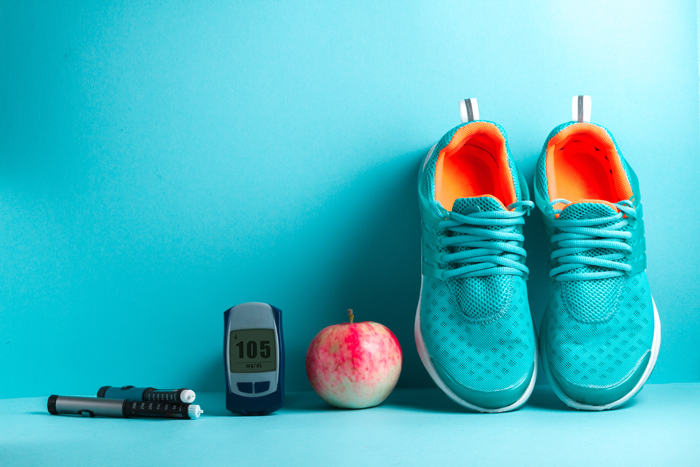Diabetes Mellitus Treatment in Koramangala, Bangalore
Diabetes is basically a group of diseases that affect how the body uses glucose. Glucose is the most important source of energy in our body. It also acts as a fuel for the brain. Diabetes may have multiple underlying causes, but whatever the type is, it leads to excess blood sugar. This leads to serious health complications.
What do you need to know about diabetes and its care?
Diabetes is a very serious health hazard. It is important to take proper care with diet, exercise and other lifestyle modifications. Doing so will reduce the risk of multiple life-threatening complications.
Types of diabetes include type 1 diabetes, type 2 diabetes and gestational diabetes. Pre-diabetic conditions are seen in people who are predisposed to having diabetes because of genetic conditions or lifestyle causes or both. Gestational diabetes as well as pre-diabetic conditions are reversible.

To know more about diabetic care and management, you can search online for a general medicine hospital near me or a general medicine doctor near me.
What are the common symptoms of diabetes?
They usually depend upon how elevated the blood sugar levels are. Some of the signs and symptoms of type 1 and type 2 diabetes are:
- Frequent urination especially at night
- Hunger
- Weight loss which is unexplained
- Presence of ketones in the urine
- Extreme fatigue
- Irritability
- Blurred vision
- Slow healing scars
- Frequent skin and vaginal infections
What causes diabetes?
Diabetes is caused by a malfunction in the insulin and glucose system of the body. Insulin is a hormone that is secreted from the pancreas. It enables the regulation of blood sugar levels. When the blood sugar level drops, secretion of insulin also decreases.
- The exact cause of type 1 diabetes is unknown. However, it is known that the insulin-producing cells of the pancreas are destroyed, hence insulin is not available in the bloodstream, which leads to an increased sugar availability in the blood.
- Type 2 diabetes is formed when the cells become resistant to the action of insulin and hence, the pancreas is unable to make enough insulin to remove this resistance. Having a higher body mass index is strongly linked to the development of type 2 diabetes.
When do you need to see a doctor?
You should meet your healthcare provider at the earliest if you suspect having any symptoms or signs of diabetes. If you are pre-diabetic, you should also maintain regular health checkups and keep in touch with your doctor.
Request an appointment at Apollo Spectra Hospitals, Koramangala, Bangalore.
Call 1860 500 2244 to book an appointment.
What are the risk factors we need to be aware of for diabetes care?
There are multiple risk factors for the development of diabetes:
- Family history
- Weight
- Age
- Pregnancy
- Inactivity
- Polycystic ovarian syndrome
- Cholesterol levels
- Blood pressure levels
What are some of the steps that you can take to keep your blood sugar levels under control?
- It is important to make a resolution or commitment to keeping your blood sugar levels under control.
- Stop smoking and taking nicotine-based products immediately.
- Keep blood pressure level under control.
- Take appropriate vaccinations, by keeping in touch with your healthcare provider.
- Take care of your teeth, visit a dentist regularly, and also brush twice a day.
- Avoid stress, by indulging in relaxation techniques.
- Keep in touch with your doctor and get a regular physical examination and eye examination done.
How can we prevent diabetes?
Type 1 diabetes cannot be prevented, type 2 diabetes can certainly be prevented by exercising and making healthy lifestyle choices.
- Eat healthy
- Do physical activity
- Lose excess weight
Sometimes your doctor may put you on some medications, such as metformin which is usually an oral diabetes drug that reduces the development of type 2 diabetes. However, making healthy lifestyle choices is still extremely essential.
Conclusion
There are multiple complications that can develop if you have diabetes and your blood sugar levels are uncontrolled. These complications can include cardiovascular diseases, neuropathy or nerve damage, kidney damage and damage to the eyes, among other things. In gestational diabetes, complications include preeclampsia and type 2 diabetes in the baby. Ensure proper diabetes care.
Alcohol consumption lowers your blood sugar levels and makes you prone to hypoglycemia. If you are consuming alcohol, you should do so responsibly. Consulting your doctor.
Paracetamol is deemed a generally safe drug by physicians. However, if you are diabetic and also have kidney complications, then you should consult your doctor before taking any medication, because it may lead to further kidney damage.
OTC cough syrup medications usually have a lot of sugar. If your blood sugar levels are not in control, then it is important to consult your doctor and take a sugar-free medication.


.svg)
.svg)
.svg)
.svg)









